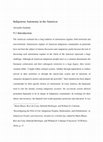Books by Alexandra Xanthaki
Papers by Alexandra Xanthaki
Presses de l'Université Laval eBooks, Nov 28, 2023
The International Journal of Children's Rights, Feb 14, 2022
European Journal of Law Reform, 2000
Indigenous Cultural Rights in International Law 345 indigenous child 'to enjoy his/her cultu... more Indigenous Cultural Rights in International Law 345 indigenous child 'to enjoy his/her culture' (Article 30). The 1978 UNESCO Declaration on Race and Racial Prejudice also emphasizes the right of all individuals and groups (emphasis added) 'to be different' (Articles 1 and 5). ...

Oxford University Press eBooks, Oct 1, 2015
2010), p. 17. 'thinly masked slavery'. In North America, the English chose to create new societie... more 2010), p. 17. 'thinly masked slavery'. In North America, the English chose to create new societies separate from the existing indigenous communities. After wars, enslavement, and forced relocations, they often concluded treaties of coexistence, albeit at times with dire conditions for indigenous groups. 2 The different strategies of colonizers were determined also by the circumstances, for example the large numbers of indigenous inhabitants in Latin America and the rather smaller numbers of indigenous inhabitants in North America. As time went by, the lines between Spaniards and indigenous Americans became blurred in Latin America, whereas such lines remained rather obvious in North America. At the same time, the Spaniards were more focused on taking the natural resources of the territories they occupied, whereas the English spent more time developing trade and agriculture. Nothwithstanding the different ways, both strategies led to the extinction, structural discrimination, and historical injustices of the American indigenous communities. Indigenous peoples of the whole of the Americas suffered intensely from centuries of assimilation polices imposed on them by the newcomers. Panama and Brazil are notable examples of assimilation for centuries, but so are Guatemala and its adopted 2 Christopher Minster, 'Spain's American Colonies and the Encomienda System',

The International Journal of Human Rights, May 18, 2016
The 'integration' of members of minorities into the European societies where they live seems to h... more The 'integration' of members of minorities into the European societies where they live seems to have become a buzzword. This paper disagrees with the blanket endorsement of integration as a positive policy, as currently shared by European states. It aims to demonstrate that contrary to the prevailing belief by states and international human rights bodies that 'integration' contributes to the realisation of human rights of minorities and to social cohesion, integration of members of minority communities has been amply used to dilute the protection they enjoy under international human rights law. In order to prove this argument, the article first discusses how international bodies and academic literature present integration as a positive element of minority rights. The article then identifies five specific ways in which integration rhetoric and policies limit minority rights: states have used the integration concept in international fora to justify assimilationist policies; they have interpreted it as setting obligations only to migrants rather than the state; and have used it as an obstacle to the naturalisation of migrants. Integration has been used to deny members of minorities positive protection; and as a vehicle to promote stereotypes of human rights as European only values. The article concludes that the uses of integration at the international level harms minority protection; hence, international policies regarding minority rights should be placed back within the context of existing standards of international law, rather than the loose and hazy context of integration.

Brill | Nijhoff eBooks, 2007
Multiculturalism is a concept that recognises and celebrates cultural identities. Opponents of mu... more Multiculturalism is a concept that recognises and celebrates cultural identities. Opponents of multiculturalism argue that multiculturalism policies contribute to extremism, because they lead to the segregation of groups. This chapter addresses the criticisms that the multicultural ideal currently faces by employing current international law. According to C. Taylor, the autonomous, self-determining individual needs a social matrix that promotes in practice this exact idea of autonomy and gives opportunities for the individual to practice and develop her autonomy. Multiculturalism is also accused of devaluating national identity. The mere recognition of multiple identities does not lead to a truly multicultural society, as segregation can surface through measures aimed at the protection of the groups' distinctiveness. Criticisms against multiculturalism have been mainly based on a model that ignores the interaction between groups. Keywords: extremism; international law; multiculturalism; national identity; segregation
The British Library Document Supply Centre eBooks, 2001
Available from British Library Document Supply Centre-DSC:DXN052607 / BLDSC - British Library Doc... more Available from British Library Document Supply Centre-DSC:DXN052607 / BLDSC - British Library Document Supply CentreSIGLEGBUnited Kingdo

This chapter examines the rights to culture in Articles 11(1), 12, 13(1), and 34. The freedom of ... more This chapter examines the rights to culture in Articles 11(1), 12, 13(1), and 34. The freedom of indigenous peoples to have their indigenous identities and cultures respected has been the main incentive for their struggle and one of the main reasons for the adoption of the United Nations Declaration on the Rights of Indigenous Peoples (UNDRIP). The recognition of indigenous cultural rights is deeply rooted in the principle of respect of the diversity and richness of their identities, the end of historical injustices committed against them, and the principle of self-determination, all of which are incorporated in the preamble of the Declaration. Unfortunately, patterns of expropriation of indigenous religious and cultural objects and neglect, even destruction of indigenous cultural manifestations, still continue. In addition, new waves of tourism beyond ‘the beaten truck’ commodify important indigenous historical and archaeological sites. It is therefore of no surprise that the protection of culture is so important in the whole text of the Declaration.

The International Journal of Human Rights, May 21, 2021
ABSTRACT This article introduces the special issue of the International Journal of Human Rights o... more ABSTRACT This article introduces the special issue of the International Journal of Human Rights on the cultural and linguistic rights of minorities and indigenous peoples. The right to cultural life is at the core of all human identities but indigenous peoples and minorities have particular rights to protect their collective identities, which are more easily eroded by dominant culture(s) or due to harmful practices such as involuntary assimilation. The conference brought together scholars and activists to examine such threats in practice and to discuss the role of law and social mobilisation by minorities and indigenous peoples in response. The impact of recent events such as Covid-19 and the Black Lives Matter transnational mobilisation are discussed in this introduction to illustrate how these major contemporary events also relate to cultural rights. The article provides an overview of the inter-disciplinary articles included in the special issue, which focus on key illustrative case studies of threats to cultural and linguistic rights across regions. The UNESCO Convention for the Safeguarding of the Intangible Cultural Heritage is a focus in several of the articles, as is with the role of international human rights law in protecting cultural and linguistic rights.
M. Nijhoff eBooks, 2005
Minorities, Peoples and Self-Determination Nazila Ghanea am Alexandra Xanthaki (Eds.) ... Minorit... more Minorities, Peoples and Self-Determination Nazila Ghanea am Alexandra Xanthaki (Eds.) ... Minorities, Peoples and Self-Determination Essays in Honour of Patrick Thornberry ... Minorities, Peoples and Self-Determination Essays in Honour of Patrick Thornberry ...
Human Rights Quarterly, 2010
This paper aims to assess the contribution of current international human rights law to the multi... more This paper aims to assess the contribution of current international human rights law to the multicultural debate. The paper argues that although international law has not engaged in a sustained way with the concept, the basic elements of multiculturalism are promoted by current standards. Among these discussed are the recognition of cultural attachments in the public sphere, the need for interaction among cultures and the understanding of sub-national groups as equal partners in the evolution of the society. A closer look at the standards and their dynamic interpretation by United Nations bodies also reveals helpful answers to difficult challenges currently posed by multiculturalism, including extremism and clashes between cultural practices and other human rights. I.
Brill | Nijhoff eBooks, May 2, 2019
The Cultural Heritage of Minorities and Indigenous Peoples 2 The EU Legislative Framework: Yes bu... more The Cultural Heritage of Minorities and Indigenous Peoples 2 The EU Legislative Framework: Yes but No… 2.1 The EU Treaties 271 Article 2 of the Treaty of Lisbon8 explicitly proclaimed the respect of the EU for minority rights: The Union is founded on the values of respect for human dignity, freedom, democracy, equality, the rule of law and respect for human rights, including the rights of persons belonging to minorities. These values are common to the Member States in a society in which pluralism, nondiscrimination, tolerance, justice, solidarity and equality between women and men prevail.
Cambridge University Press eBooks, May 17, 2007
European Public Law, Dec 1, 2005
Massad makes an important argument regarding self-determination, one that has started being centr... more Massad makes an important argument regarding self-determination, one that has started being central in the way we tackle the realisation of indigenous self-determination in the future. From being seen as a perfect example of a new, more inclusive era of human rights law, indigenous self-determination increasingly invites questions about its real contribution to indigenous struggles for a better future. In this context, Massad’s piece makes an important contribution

Uploads
Books by Alexandra Xanthaki
Papers by Alexandra Xanthaki